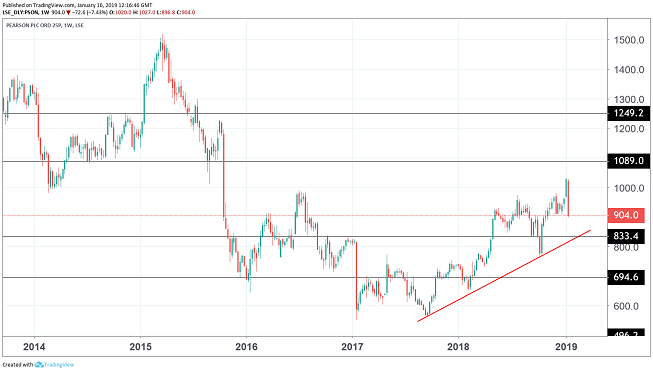Pearson shares labelled 'too expensive' after new update
16th January 2019 13:12
by Graeme Evans from interactive investor
As one of the best performers of the last 18 months, Pearson must justify investor faith in the business. Graeme Evans reveals whether it's done enough.

Having surprised everyone with the fourth best performance in the FTSE 100 index in 2018, the pressure is on educational publisher Pearson to show that its 27% share price rise was no flash in the pan.
Meeting the raised expectations of investors and City analysts will be no easy task if the reaction to today's end of year trading update is anything to go by.
On the face of it, boss John Fallon delivered what looked to be another strong performance, with profits of between £540 million and £545 million for 2018 being bang in the middle of previous guidance.
But the concern among analysts is that around £50 million of extra cost savings were needed to drive the 2018 performance, rather than revenues growth. In addition, guidance for 2019 profits of between £590 million and £640 million is not quite as emphatic as some might have hoped.
Earlier this month, shares broke the £10 barrier for the first time since 2015. But the stock is now back at just above 900p, with today's 6% slide adding to the reversal of fortunes seen in the past week. As the stock is still heavily shorted, that's music to the ears of various hedge funds.
Analysts at Citigroup have a price target of 975p, but add there are questions to be answered:
"Given the heavily negative sentiment and the move up into the results, we expect the bears to focus on the quality of the earnings and in particular the cost savings point."

Source: TradingView (*) Past performance is not a guide to future performance
Morgan Stanley noted that without the better-than-expected cost savings Pearson would have missed its profits guidance by around £20 million, suggesting that "revenue has not developed in 2018 as it hoped".
Organic revenues declined 1% in the year, with US higher education courseware at the low end of guidance following a fall of 5%. This division is being impacted by lower student numbers and a trend to rent not buy books, although digital sales are helping to offset some of the pressure.
Fallon believes Pearson is well placed after returning to underlying profits growth in 2018 and progressing towards the company's "full digital potential".
He added:
"There is much still to do, but we are increasingly confident in Pearson's potential to grow and prosper."
As part of the turnaround, Pearson announced plans in August 2017 to cut 3,000 jobs alongside a 72% reduction in the half-year dividend. Fallon said he now expects annual cost savings to exceed £330 million by the end of 2019, ahead of the original forecast for £300 million.
Net debt of about £200 million at the end of 2018 is also more than half the previous year's level and significantly better than forecast in the City.
Pearson currently trades on a price/earnings (PE) multiple of 16x, with 1.9% dividend yield. Analysts at Redburn said:
"This is too expensive for a company that still derives 35-40% of core earnings from a predominately print textbook business in structural decline."
*Horizontal lines on charts represent levels of previous technical support and resistance. Trendlines are marked in red.
These articles are provided for information purposes only. Occasionally, an opinion about whether to buy or sell a specific investment may be provided by third parties. The content is not intended to be a personal recommendation to buy or sell any financial instrument or product, or to adopt any investment strategy as it is not provided based on an assessment of your investing knowledge and experience, your financial situation or your investment objectives. The value of your investments, and the income derived from them, may go down as well as up. You may not get back all the money that you invest. The investments referred to in this article may not be suitable for all investors, and if in doubt, an investor should seek advice from a qualified investment adviser.
Full performance can be found on the company or index summary page on the interactive investor website. Simply click on the company's or index name highlighted in the article.